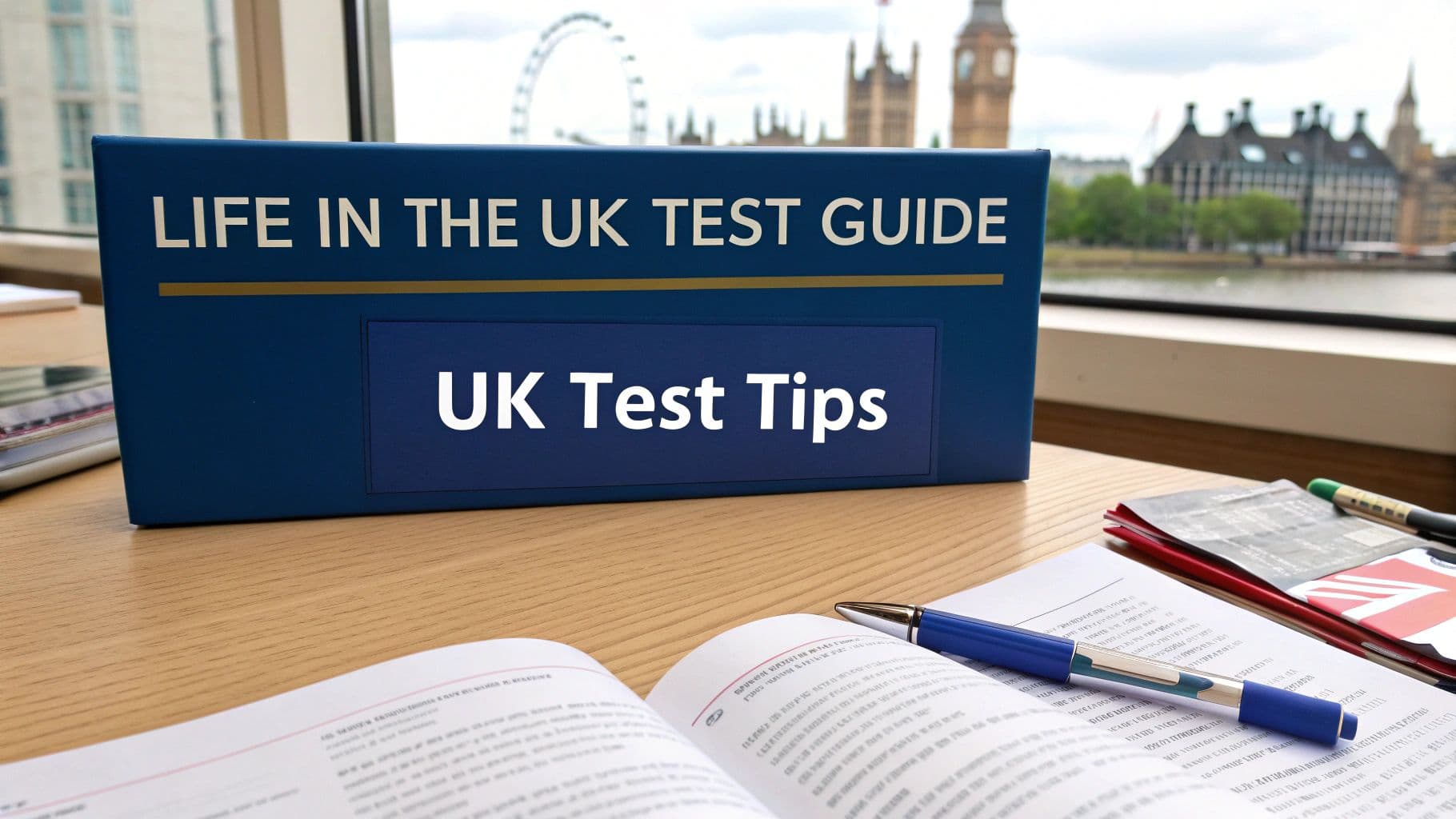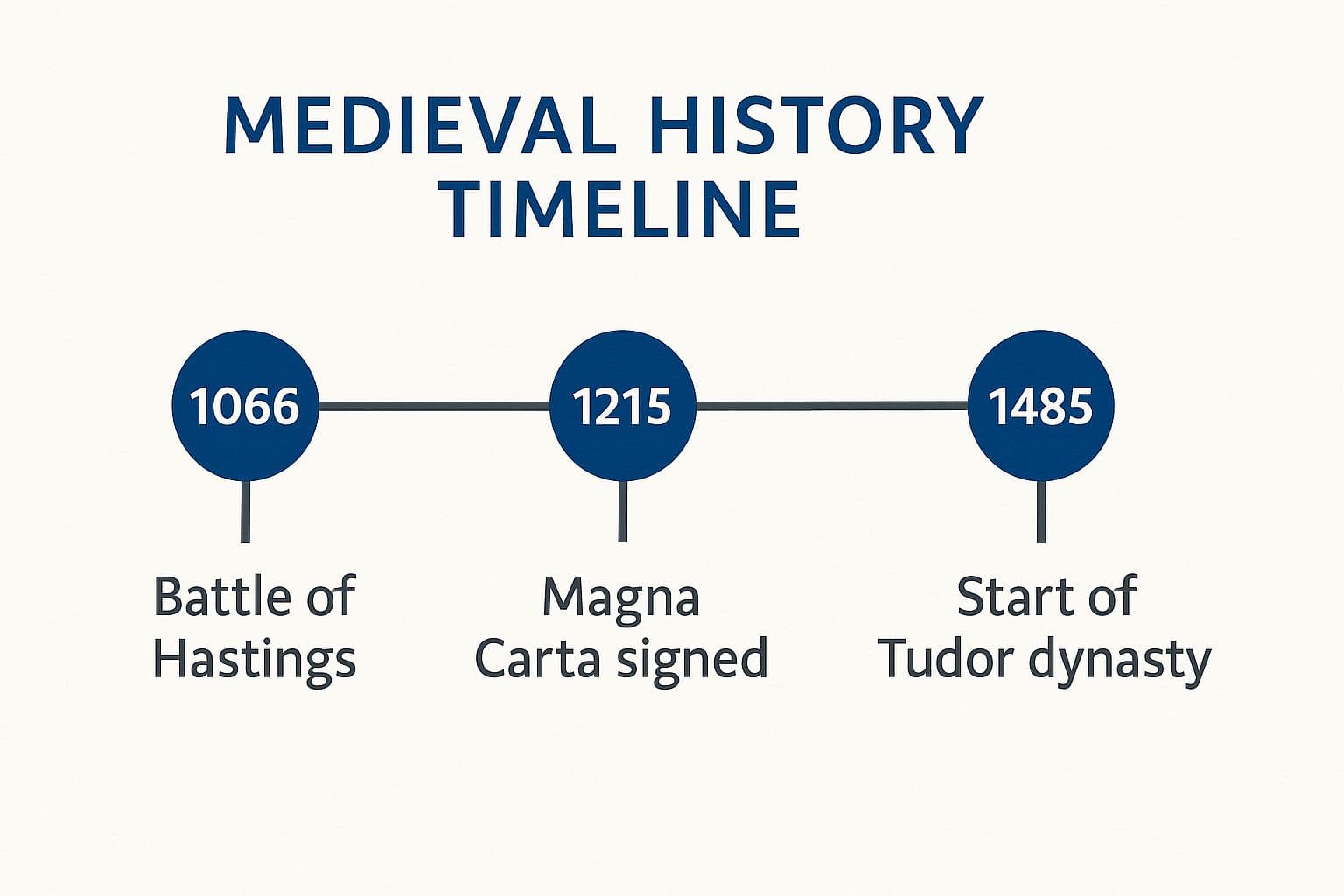Ace the Life in the UK Test Questions | Practice & Tips 2025

Decoding the Life in the UK Test
Preparing for the Life in the UK test? This listicle covers 7 key areas to help you pass: Values and Principles of the UK, UK History (Middle Ages to present), Government and Law, Traditions and Festivals, Geography and Landmarks, and Arts, Literature and Sports. Understanding these concepts is crucial for obtaining UK citizenship or settlement. We'll explore each topic with practice Life in the UK Test questions and resources, including insights from our Life in the UK Test App, to boost your chances of first-time success.
1. The Values and Principles of the UK
This section of the Life in the UK test is crucial for anyone seeking citizenship or settlement. It focuses on the fundamental principles that shape British society and its laws, covering key concepts like democracy, the rule of law, individual liberty, and mutual respect and tolerance. Understanding these values isn't just about passing the test; it's about integrating into British life and contributing positively to the community. This section explores the historical development of these principles, ensuring you have a well-rounded understanding of their significance. Doing well on this part of the test demonstrates your commitment to upholding these values as a future citizen or resident.

The test explores your understanding of core British values through various question formats, including true/false and multiple-choice questions. For instance, you might be asked to identify a fundamental principle of British life from a list of options (e.g., respecting the law versus supporting a specific political party). You could also be asked true/false questions regarding the UK's constitution (e.g., True or False: The UK does not have a written constitution in a single document). These questions are designed to assess your knowledge of democratic institutions like Parliament and the concept of separation of powers in UK governance. The section also delves into the practical application of tolerance and respect within a multicultural society, examining how these values apply to different religions and beliefs.
Tips for mastering this section of the Life in the UK test:
Memorize the four fundamental British values: Focus on understanding what democracy, the rule of law, individual liberty, and mutual respect and tolerance mean in practice.
Study the role of Parliament: Understand how Parliament functions within a democratic system and its role in creating and upholding laws.
Understand how tolerance applies to different religions and beliefs: The UK is a diverse nation, and the test assesses your understanding of respecting different faiths and viewpoints.
Learn about separation of powers in UK governance: This principle is vital to the UK's democratic system, ensuring a balance of power.
This topic is highly relevant for those preparing for the Life in the UK Test. It deserves its place in the list due to its focus on the core values that underpin British society. By understanding these principles, you demonstrate your commitment to integrating and contributing positively to the UK. Focusing on this section ensures you're not only prepared for the exam but also equipped to embrace life in the UK fully.
2. UK History: The Middle Ages and Tudor Period
This section of the Life in the UK test focuses on a significant period of British history, spanning from the Norman Conquest in 1066 to the end of the Tudor dynasty in 1603. It's a crucial area for the test as it covers formative events in British constitutional development, including the evolution of parliamentary democracy and key religious changes. Understanding this period provides context for the UK's current political and social landscape, which is why it's included in the Life in the UK test questions. This era covers key historical events, significant monarchs, and the development of parliamentary democracy, testing your understanding of the foundations of modern Britain.

The infographic above visualizes key milestones within the Middle Ages and Tudor period, starting with the Norman Conquest and concluding with the Elizabethan era. It helps illustrate the progression of power and the significant shifts in religious and political landscapes.
This period encompasses over 500 years of complex history, starting with the Norman Conquest in 1066, which radically transformed English society and governance. The Middle Ages witnessed the signing of Magna Carta in 1215, a landmark document that limited the power of the monarchy and laid the groundwork for future constitutional developments. The Wars of the Roses, a series of dynastic conflicts in the 15th century, further shaped the political landscape. The Tudor period, beginning with Henry VII's accession to the throne in 1485, saw the English Reformation, a major religious upheaval that established the Church of England. The reigns of subsequent Tudor monarchs, such as Henry VIII and Elizabeth I, were marked by significant social, political, and cultural changes.
Tips for Studying:
Create timeline flashcards for key dates: This will help you memorize the chronology of events, especially as there are many specific dates to memorize.
Focus on major constitutional developments like Magna Carta: Understand its significance and impact on the development of democracy.
Understand the significance of the English Reformation: Learn about its causes and consequences.
Learn about how Parliament began to develop: This will provide context for the UK's current political system.
Examples of Life in the UK test questions:
When was the Battle of Hastings?
Which Tudor monarch established the Church of England?
While this section of the Life in the UK test can be challenging due to the volume of information, focusing on key events, constitutional developments, and the reigns of significant monarchs will greatly improve your understanding and help you succeed on the test. This knowledge not only prepares you for the test but also provides valuable insights into the rich history that has shaped the UK. The official Life in the UK: A Guide for New Residents handbook is a highly recommended resource, which is also available right in the Life in the UK Test App for free.
3. Modern British History (1900-present)
This section of the Life in the UK test focuses on Modern British History, spanning from 1900 to the present day. It's a crucial part of the exam, designed to assess your understanding of how key historical events have shaped contemporary Britain. For anyone aiming to make the UK their home, grasping this historical context is vital for integrating into society and understanding the nation's current political and social landscape. This makes it a deserved inclusion in the Life in the UK Test questions.
This section delves into several key areas:
The Impact of the World Wars: The test explores the effects of both World Wars on Britain, covering social, economic, and political changes. Understanding this period is essential as it laid the groundwork for many of the UK's current institutions and social structures.
The Establishment of the NHS: A cornerstone of British society, the National Health Service (NHS) is frequently featured in the test. You'll need to know when it was founded and understand its significance. For example, a typical question might be: When was the National Health Service (NHS) established? A) 1945 B) 1948 C) 1952 D) 1958 (The correct answer is B).
Waves of Immigration: The test covers key immigration waves, such as the Windrush generation, and their impact on British society and culture. This includes understanding the challenges and contributions of immigrants.
Devolution: The transfer of power from the central government to Scotland, Wales, and Northern Ireland (devolution) is also assessed. This includes understanding the different powers held by these devolved administrations.
Modern Political Developments: Beyond these specific areas, the test also touches upon other significant political developments of the 20th and 21st centuries, helping you build a comprehensive picture of modern Britain.
This section is arguably the most relevant to understanding the UK today, as it directly links historical events to current institutions and social structures. It helps you connect the dots between historical events and the UK's current political, social, and economic landscape.
However some of the political aspects, especially recent developments, can be complex and require careful study.This section also often involves memorizing specific dates and figures, which can be challenging.
Tips for Success:
Focus on Post-WWII Developments: Pay special attention to the period after World War II, as it saw significant social and political change, including the establishment of the NHS and the beginning of decolonization. An example of a Life in the UK Test question related to this topic might be: Which of these countries was NOT part of the UK's decolonization after WWII? A) India B) Nigeria C) Canada D) Kenya (The correct answer is C)
Memorize Key Dates: Learn the specific dates for the establishment of major institutions like the NHS.
Understand the Significance of Immigration: Study the impact of various immigration waves, particularly the Windrush generation.
Study the UK's Changing Global Role: Understand how the UK’s role in the world changed after the decline of its empire.
Preparing for this section requires dedicated study, but the knowledge gained will significantly enrich your understanding of the UK and its journey to becoming the nation it is today.
4. UK Government, Law and Your Role
This section of the Life in the UK test focuses on your understanding of how the UK government works, the legal system, and your role as a citizen. It's a crucial part of the test because it assesses your knowledge of the democratic principles and civic responsibilities that underpin British society. Succeeding in this section demonstrates your readiness to participate actively in UK life. This is one of the core topics covered in the Life in the UK Test questions, so understanding it well is vital for passing.
This section covers a broad range of topics, including:
The British Political System: You'll need to know how Parliament functions, the roles of the House of Commons and the House of Lords, and the relationship between the government and the monarchy. For example, you might be asked about the process of passing a law or the role of the Prime Minister.
Voting Rights and Procedures: Understanding how elections work, who is eligible to vote, and how to register is essential. Sample Life in the UK Test questions might include: At what age can you vote in UK general elections? A) 16 B) 17 C) 18 D) 21 (correct answer is C) or How often must Parliamentary general elections be held? A) At least every 4 years B) At least every 5 years C) At least every 6 years D) At least every 8 years (correct answer is B).
The Court System: This includes understanding the different types of courts in the UK (e.g., Magistrates' Court, Crown Court, Supreme Court) and their respective functions.
Local Government: You'll also need to be familiar with the structure and responsibilities of local councils and devolved administrations (Scotland, Wales, Northern Ireland).
This knowledge empowers you to engage effectively with the political and legal systems in the UK. Understanding how these institutions work makes it easier to access services and exercise your rights.
Note that the UK's governmental and legal systems can be intricate, requiring detailed study.
Tips for Success:
Understand the difference between the roles of the Queen/King, Prime Minister, and Parliament: Clarifying these distinct roles is fundamental.
Learn the different court systems across the UK: Familiarize yourself with the hierarchy and function of each court.
Know the voting eligibility requirements: Be clear on who can vote and how to register.
Study the devolved administrations: Understand the specific powers and responsibilities of the governments in Scotland, Wales, and Northern Ireland.
Make sure you understand the nuances and complexities of the UK's government and legal systems, which will not only help you pass the test but also empower you to participate fully in your new community.
5. UK Traditions, Customs and Festivals
This section of the Life in the UK test focuses on UK traditions, customs, and festivals. It assesses your knowledge of British cultural practices, including national holidays, sporting events, and traditional celebrations. Understanding these aspects of British life is crucial for integrating into society and demonstrating your commitment to becoming a part of the UK. This section tests your understanding of how these traditions contribute to British identity. It's a key component of the Life in the UK test, ensuring applicants have a grasp of the cultural landscape they are joining.
 The questions in this section cover a range of topics, from major UK holidays and their significance to traditional British sports and cultural celebrations. It also includes questions on the multicultural festivals celebrated in modern Britain, reflecting the diverse nature of UK society. This reflects the evolving and inclusive nature of British culture.
The questions in this section cover a range of topics, from major UK holidays and their significance to traditional British sports and cultural celebrations. It also includes questions on the multicultural festivals celebrated in modern Britain, reflecting the diverse nature of UK society. This reflects the evolving and inclusive nature of British culture.
Features:
Covers major UK holidays and their significance (e.g., Christmas, Easter, Bank Holidays).
Tests knowledge of traditional British sports (e.g., cricket, football, rugby).
Includes questions on cultural celebrations (e.g., Bonfire Night, Remembrance Day).
Examines multicultural festivals in modern Britain (e.g., Diwali, Eid, Notting Hill Carnival).
This section is often considered easier than the historical or political sections of the Life in the UK test. The knowledge would will gain will directly be applicable to social integration and understanding everyday life in the UK.
Examples of Life in the UK Test Questions:
Which of these is a national saint's day celebrated in the UK? A) St. Patrick's Day B) Thanksgiving C) Bastille Day D) Independence Day (correct answer is A).
Which sport is traditionally associated with Wimbledon? A) Cricket B) Football C) Rugby D) Tennis (correct answer is D)
Tips for Success:
Learn the four national saints' days and when they occur: St. David's Day (Wales), St. Patrick's Day (Northern Ireland), St. George's Day (England), and St. Andrew's Day (Scotland).
Understand which sports are most popular in specific regions: While football is popular throughout the UK, understanding regional variations like rugby in Wales or cricket in England can be helpful.
Know the major annual cultural events like Notting Hill Carnival, Bonfire Night, and Remembrance Day: Understanding their history and significance is important.
Study how Christmas, Diwali, Eid, and other festivals are celebrated in the UK: This demonstrates an awareness of the diverse cultural landscape.
Why this section deserves its place in the Life in the UK test: Understanding British traditions, customs, and festivals is essential for anyone seeking to live and work in the UK. It fosters social integration, promotes understanding of British values, and helps newcomers participate fully in their communities. This knowledge is not just for the test; it's for life in the UK. By demonstrating this understanding, applicants show a genuine interest in becoming part of British society. The "UK Traditions, Customs and Festivals" section is vital for preparing individuals for a successful and enriching life in their new home.
6. UK Geography and Landmarks
UK Geography and Landmarks is a crucial section of the Life in the UK test. This section tests your knowledge of the UK's physical geography, major cities, landmarks, and regional differences. It examines your understanding of the country's geographic structure and notable places, ensuring you possess a basic understanding of the UK's layout and key locations. This knowledge is not only essential for passing the Life in the UK test, but also for navigating daily life in the UK, understanding news and conversations, and appreciating the diverse landscapes of your new home. This section deserves its place in the test as it gauges your grasp of fundamental UK geographical knowledge.
 This section of the Life in the UK test covers various aspects of UK geography, including:
This section of the Life in the UK test covers various aspects of UK geography, including:
The four UK nations and their capitals: You'll need to know the capitals of England (London), Scotland (Edinburgh), Wales (Cardiff), and Northern Ireland (Belfast).
Major rivers and mountains: Expect questions about important rivers like the Thames, Severn, and Clyde, and mountains such as Ben Nevis (the highest peak in the UK), Snowdon, and the region of the Lake District.
Famous landmarks and their locations: Questions might focus on landmarks like Stonehenge, Buckingham Palace, the Giant's Causeway, and Edinburgh Castle. Knowing where these landmarks are situated within the UK is essential.
Population distribution: While not heavily focused on, the test may touch upon the general distribution of the UK population, such as higher concentrations in urban areas.
Examples of Life in the UK test questions:
Which is the highest mountain in the UK? A) Ben Nevis B) Snowdon C) Scafell Pike D) Slieve Donard (correct answer is A).
Which city is known as the UK's second city? A) Manchester B) Edinburgh C) Birmingham D) Glasgow (correct answer is C).
Tips for Success:
Study maps: Use maps of the UK, its nations, counties, and major cities to familiarize yourself with the locations of key features. Visual learning materials can greatly aid memorization.
Learn key geographic features: Study areas like the Lake District, the Scottish Highlands, the Pennines, and the Cotswolds.
Landmark locations: Pinpoint the location of major landmarks on a map. Create flashcards or use online resources to help you memorize their locations.
Understand the differences between the four nations: Learn the basic distinctions between England, Scotland, Wales, and Northern Ireland, including their cultural identities and historical contexts.
By focusing on these tips and dedicating time to study, you can effectively prepare for the UK Geography and Landmarks section of the Life in the UK test. This preparation will not only help you pass the test but will also provide you with valuable knowledge for life in the UK.
7. UK Arts, Literature and Sports
This part of the test explores how British culture has shaped the nation's identity and its standing on the world stage. It delves into the impact of British artists, writers, musicians, filmmakers, and sportspeople. This section deserves its place in the list because it tests your knowledge of a fundamental aspect of British life - its cultural heritage. Understanding this rich tapestry is key to integrating into British society and appreciating the UK's diverse cultural landscape.
What it Covers:
The UK Arts, Literature and Sports section covers a broad spectrum of cultural topics, including:
Major British authors and their works: Expect questions on literary giants like Shakespeare, Jane Austen, Charles Dickens, and more contemporary authors. You might be asked about specific novels, plays, or poems and their cultural significance.
UK Musical Contributions: From classical composers like Handel and Elgar to iconic bands like The Beatles and The Rolling Stones, this area explores the UK’s diverse musical landscape. Questions may focus on origins, genres, or influential figures.
British Film and Theatre: This includes prominent actors, directors, playwrights, and landmark films or theatrical productions. Understanding the cultural impact of British cinema and theatre is important.
Sporting Traditions and Events: This section covers sports that originated in the UK, such as football, rugby, and cricket, as well as significant sporting events like Wimbledon and the FA Cup, and significant athletes.
Examples of Life in the UK Test Questions:
Who wrote 'Pride and Prejudice'? A) Jane Austen B) Charles Dickens C) Virginia Woolf D) George Orwell (correct answer is A).
Which of these bands originated in Liverpool in the 1960s? A) The Rolling Stones B) The Beatles C) The Who D) Led Zeppelin (correct answer is B).
For many test-takers, this section is more interesting and enjoyable than other, more procedural parts of the exam. Knowledge of British arts, literature, and sports can help you connect with people in the UK and participate in cultural conversations.
However there's a vast amount of potential information to cover, which can feel overwhelming.
Tips for Success:
Focus on Internationally Recognized Figures: Prioritize learning about the most globally famous British cultural icons, as these are more likely to appear in the exam.
Learn Origins of UK Sports: Understand which sports originated in the UK and their historical development.
Know Major Cultural Institutions: Familiarize yourself with institutions like the British Museum, the National Gallery, and the BBC, and their roles in British culture.
Understand the BBC's Significance: The BBC plays a crucial role in British media and culture, so understanding its influence is important.
Life in the UK Test Question Comparison
Question Area | Studying Difficulty | Expected Outcomes |
|---|---|---|
The Values and Principles of the UK | Low - based on memorization of core concepts | Strong understanding of British cultural/political foundations |
UK History: The Middle Ages and Tudor Period | Medium - many dates and events to learn | Knowledge of formative constitutional events |
Modern British History (1900-present) | Medium-High - complex political and social events | Understanding of contemporary Britain and its institutions |
UK Government, Law and Your Role | High - complex systems and recent changes | Detailed civic participation and government knowledge |
UK Traditions, Customs and Festivals | Low - focused on everyday cultural knowledge | Awareness of British cultural identity and celebrations |
UK Geography and Landmarks | Low-Medium - factual geographic data | Basic UK geography understanding for navigation |
UK Arts, Literature and Sports | Medium-High - diverse cultural references and names to recall | Broader cultural literacy and appreciation |
Preparing for Success: Your Next Steps
Successfully navigating the Life in the UK test hinges on understanding key aspects of British life, from its core values and historical milestones to its modern governance and rich cultural tapestry. This article has provided a glimpse into the topics covered in the test, including the values and principles of the UK, significant periods in UK history (from the Middle Ages and Tudor period to the 20th and 21st centuries), the workings of the UK government, and the nation's unique traditions, geography, and contributions to arts, literature, and sports. Mastering these areas is crucial not only for passing the test but also for integrating smoothly into British society and making the most of your life in the UK.
Remember, effective preparation is the key to success. By focusing your studies on the topics highlighted above and understanding the nuances of each, you'll be well-equipped to answer those all-important Life in the UK test questions with confidence. Your dedication to understanding these concepts will empower you to not just pass the test, but truly become a part of the vibrant fabric of the UK.
You should also check our article on how to manage your Life in the UK Test Practice | Boost Your Success Today.
Ready to take the next step in your journey towards British citizenship? The Life in the UK Test App offers a comprehensive platform with practice Life in the UK test questions, mock tests, and guided study plans to help you prepare effectively, anytime, anywhere. Start your preparation today and boost your confidence for test day!